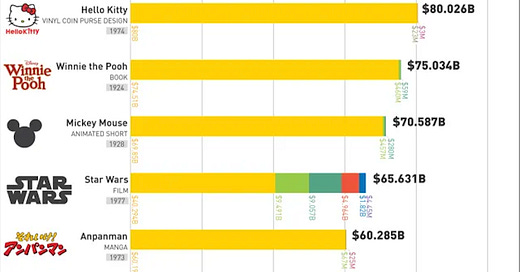
Introduction
Launched in 1996 by Satoshi Tajiri and Ken Sugimori, Pokémon began as a simple handheld video game for Game Boy. Today, it stands as the world's most valuable intellectual property (IP), with a staggering value of over $90 billion.
The Genesis of Pokémon
Satoshi Tajiri's fascination with collecting creatures evolved into Pokémon, with Nintendo backing the project (32% ownership).
Launched in Japan as "Pocket Monsters," the game was a hit, thanks to its unique gameplay mechanics that encouraged exploration and collection. Early success hinged on the novel concept of 'collect them all,' leveraging the human penchant for completion and competition.
Global Expansion
Post-Japanese success, Pokémon ventured abroad, a move that proved to be transformative. Localization and a comprehensive marketing strategy were crucial to this expansion.
For example, renaming "Pocket Monsters" to "Pokémon" for western audiences increased market appeal, while the tagline "Gotta catch 'em all!" capitalized on the game's core mechanic. Overcoming initial challenges, Pokémon's international presence solidified its global brand.
From Trading Cards to Television and Beyond
Pokémon's expansion wasn't just geographical; it permeated various forms of media. The Pokémon Trading Card Game became a sensation, while the animated television series and movies, with their endearing narratives, broadened Pokémon's appeal.
It is hard for brands to transcend multiple mediums.
This cross-media presence bolstered Pokémon's brand, with merchandise sales contributing significantly to its financial success.
The Digital Revolution: Pokémon in the Era of Mobile Gaming
In 2016, Niantic's Pokémon Go brought augmented reality (AR) and Pokémon together, creating an unprecedented mobile gaming experience. Pokémon Go amassed over 500 million downloads in its first year, showcasing the potency of Pokémon in the digital space. Subsequent digital offerings like Pokémon Home further solidified Pokémon's digital foothold.
Pokémon's Impact on the Gaming Industry
Pokémon's influence on the gaming industry cannot be overstated. It popularized handheld RPGs and collectible-based gameplay, and Pokémon Go brought AR gaming to the mainstream. Through continuous innovation, Pokémon has played a critical role in shaping the industry's evolution.
The Secret to Pokémon's Success
Pokémon's rise to becoming the most valuable IP can be attributed to strategic decision-making, continuous innovation, and a deep understanding of its fan base.
Understanding your fan base is one of the deepest keys to success across multiple industries.
By collecting or catching the Pokémon, consumers form a deep level of emotional attachment to the characters, building on the human nature of ownership and friendship.
This allows for the expanding of the brand.
By expanding its presence across media types, Pokémon has cast a wide net, capturing audiences of all ages and interests. Its core principle of collecting, trading, and battling has remained relevant, and the company's ability to innovate around this concept has been instrumental in maintaining engagement and driving growth.
The Future of Pokémon
Pokémon's future continues to look bright, with new games, expansions, and initiatives on the horizon. With a successful formula in place and a loyal fan base, Pokémon is poised to continue its reign as the most valuable IP.
Conclusion
Pokémon's journey from a simple video game to the world's most valuable IP is a testament to the power of innovation, strategic expansion, and a deep understanding of audience engagement.
As Pokémon continues to innovate and expand its reach, we can expect the franchise to remain a global powerhouse in the gaming industry for years to come. Pokémon truly embodies the phrase, "Gotta catch 'em all!"—and it seems the buyers are eager to do exactly that.
By Josh Bobrowsky






